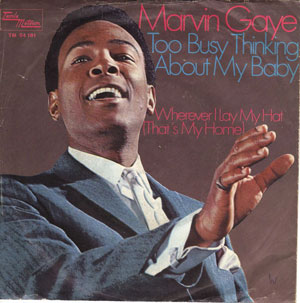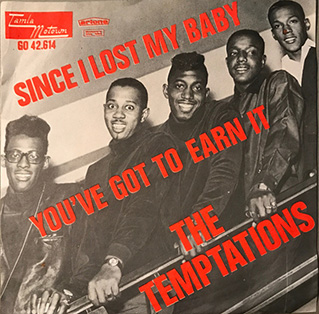Fraternity Records is a small record label based in Cincinnati, Ohio. It was started by Harry Carlson and silent partner Dr. Ashton Welsh in 1954. The first recording to be released on Fraternity was Jerri Winters' "Winter's Here". The first hit was Cathy Carr's rendition of a Tin Pan Alley song, "Ivory Tower" in 1956. It made #2, besting a cover version by Otis Williams & the Charms. A year later came the Jimmy Dorsey #2 charting instrumental "So Rare", the famous bandleader's final hit before his death. 1959 saw another big hit, Bill Parsons' "The All American Boy", which also peaked at #2 on the Billboard pop charts. Parsons was a friend of country singer Bobby Bare and it was actually Bare's voice heard on the hit record. Parsons sang on the B-side. Fraternity also leased songs from smaller labels, including one track by Jackie Shannon.

"I Can't Get Next to You" is a 1969 No. 1 single recorded by the Temptations and written by Norman Whitfield and Barrett Strong for the Gordy (Motown) label. The song was a No. 1 single on the Billboard Top Pop Singles chart for two weeks in 1969, from October 18 to October 25, replacing "Sugar, Sugar" by the Archies and replaced by "Suspicious Minds" by Elvis Presley. The single was also a No. 1 hit on the Billboard Top R&B Singles for five weeks, from October 4 to November 1, replacing "Oh, What a Night" by the Dells, and replaced by another Motown song, "Baby I'm For Real" by the Originals.

"Too Busy Thinking About My Baby" is a Motown song written by Norman Whitfield, Barrett Strong, and Janie Bradford. The song was first recorded by The Temptations as a track on their 1966 album Gettin' Ready. Eddie Kendricks sings lead on the recording, which was produced by Whitfield. Jimmy Ruffin also recorded a version with The Temptations providing background vocals in 1966. It remained unreleased until 1997.
"Wanted" is a popular song written by Jack Fulton and Lois Steele. A recording by Perry Como was the most popular version, reaching No. 1 in the US. Al Martino also recorded a version which reached No. 4 in the UK.
"Memories Are Made of This" is a popular song about nostalgia, written in 1955 by Terry Gilkyson, Richard Dehr, and Frank Miller. They were the members of a three-pieced group called "The Easy Riders", who served as a backing band for Dean Martin's version of this song, also released in 1955.
"I Almost Lost My Mind" is a popular song written by Ivory Joe Hunter and published in 1950. Hunter's recording of the song was a number one hit on the US Billboard R&B singles chart in that year.
"Gonna Get Along Without Ya Now" is a popular song written by Milton Kellem and published in 1951. Originally written in English, the first known recorded version was released in 1951, by Roy Hogsed. Since then has been done in several styles and tempos.
"A Tear Fell" is a popular song. It was written by Eugene Randolph and Dorian Burton and released in 1956.
"My Happiness" is a pop music standard which was initially made famous in the mid-twentieth century. An unpublished version of the melody with different lyrics was written by Borney Bergantine in 1933.
"And That Reminds Me", also known as "My Heart Reminds Me", is a popular song.

"Since I Lost My Baby" is a 1965 hit single recorded by The Temptations for the Motown Records' Gordy label. Written by Miracles members Smokey Robinson and Pete Moore and produced by Robinson, the song was a top 20 pop single on the Billboard Hot 100 in the United States, on which it peaked at number 17. On Billboard's R&B singles chart, "Since I Lost My Baby" peaked at number four.
"Pledging My Love" is a blues ballad. It was written by Ferdinand Washington and Don Robey and published in 1954.
"Two Hearts", or "Two Hearts, Two Kisses " is a popular song, written by Otis Williams and Henry Stone in 1954. It was originally recorded by Otis Williams and the Charms, it first reached the Billboard R&B chart on March 23, 1955, and lasted 12 weeks on the chart, peaking at number 8.

"Tell Me Why" is a popular song, written by Titus Turner in 1956. It is a slow, strong rhythm and blues ballad, and has a melody reminiscent of "Just a Closer Walk With Thee". The first hit version was by Marie Knight, a black R&B singer, on the Mercury's subsidiary label, Wing. It was a local hit in New Orleans and Texas.
"It's Just a Matter of Time" is a popular song written by Brook Benton, Clyde Otis, and Belford Hendricks. The original recording by Benton topped the Billboard Hot R&B Sides chart in 1959 and peaked at No. 3 on the Hot 100 pop chart, the first in a string of hits for Benton that ran through 1970.
"There Goes My Everything" is a popular song written by Dallas Frazier and published in 1965. "There Goes My Everything" is now considered a country music standard, covered by many artists.

"One Less Bell to Answer" is a song written by Burt Bacharach and Hal David. Originally written in 1967 for Keely Smith, the song was rediscovered in late 1969 by Bones Howe, the producer for the 5th Dimension, and the song was included on the group's 1970 debut album for Bell Records, Portrait. Lead vocals on the single were sung by Marilyn McCoo.
"A Lover's Question" is a 1958 Pop, R&B hit for Clyde McPhatter. The single was written by Brook Benton and Jimmy T. Williams and was Clyde McPhatter's most successful Pop and R&B release. The bass singer is Noah Hopkins. "A Lover's Question" made it to #6 on the Billboard Hot 100 and was #1 for one week on the R&B chart.

The Way We Were is the thirty-second studio album by American pop singer Andy Williams, released in the spring of 1974 by Columbia Records and was a return to singing songs that his audience was already familiar with after Solitaire, his previous LP that was less reliant on covers of recent pop hits, did not perform well.

"I Can't Help It (If I'm Still in Love with You)" is a song written and originally recorded by Hank Williams on MGM Records. It hit number two on the Billboard country singles chart in 1951. In his autobiography, George Jones printed the first six lines of the song and stated, "Its lyrics couldn't be more simple - or profound."






